Lori Hatcher's Blog: Refresh Blog, page 37
June 12, 2019
Why Is It So Hard to Forgive?
 The 1,000 Lincoln logs scattered on the carpet in my living room were proof that scarcity doesn’t breed selfishness. Human nature does.
The 1,000 Lincoln logs scattered on the carpet in my living room were proof that scarcity doesn’t breed selfishness. Human nature does. It's easy to understand why a starving cat would hiss and spit to keep other cats away from a morsel of food in a trash can, but it's harder to understand why someone would act selfishly in the face of abundance. Yet this was the scenario unfolding before me.
“These are mine,” one grandchild shouted. “I’m using them to build a tower.”
“No, they’re mine,” the other said, snatching the log from her sister’s hand. “I need them to build a bridge.” A tug of war ensued, and I stepped in to mediate.
“Girls, these logs aren’t yours. They belong to Gigi, and I'm sharing them with you. If you want to play with them, you’re going to have to work out a way to share with each other. If you fight again, I’m going to put them back into the attic.”
I shake my head at my grandchildren’s squabbles, yet I am often guilty of the same crime—selfishness in the face of abundance. Apparently it’s a sin that goes back to Bible times. The book of Jonah describes an ancient version of the Lincoln Log scene.
You know the story. God commanded Jonah to go to the city of Ninevah and deliver a message: Repent of your sinful ways or I will destroy you." Instead of rushing to obey, Jonah jumped aboard a ship and hightailed it in the opposite direction.
A storm arose, Jonah confessed to the crew that his disobedience was the cause, and they threw him overboard to save their lives. He sank into the depths of the sea, only to be swallowed by a giant fish.
In the belly of the fish, Jonah had lots of time to think. But he was stubborn. My, my was he stubborn. It took him three days and three nights, but finally, surrounded by partially-digested fish, his head wrapped in seaweed, and his skin bleached white from the fish’s stomach acid, he repented.
 God, in his mercy, gave him a second chance. He commanded the whale to burp Jonah out—guess where—on the coast of Ninevah. Then he repeated his call, “Arise, go to Ninevah.”
God, in his mercy, gave him a second chance. He commanded the whale to burp Jonah out—guess where—on the coast of Ninevah. Then he repeated his call, “Arise, go to Ninevah.” This time Jonah obeyed.
You’d think, after being tossed into the ocean, swallowed by a fish, and stuck in its belly for three days and three nights, Jonah would be eager to share the God of Second Chances with the Ninevites. I can hear his opening line, “Boy, do I have a story to tell you. . .”
Instead, he delivered God’s message verbatim and sulked when the entire city repented and turned to God. “This is why I didn’t want to come,” he muttered. “I know that You are a gracious and merciful God, slow to anger and abundant in lovingkindness, One who relents from doing harm” (4:2).
It’s easy to cluck our tongues at Jonah until we look in the mirror and see bits of seaweed clinging to our faces.
 Like Jonah, I readily accept God’s mercy and forgiveness. When I sin, I rush to drink from the cleansing water, allowing his grace to expunge my guilt. I revel in his mercy, marveling that one so holy would even look at a sinful soul like me, let along welcome me into a relationship.
Like Jonah, I readily accept God’s mercy and forgiveness. When I sin, I rush to drink from the cleansing water, allowing his grace to expunge my guilt. I revel in his mercy, marveling that one so holy would even look at a sinful soul like me, let along welcome me into a relationship. Yet when the opportunity comes to extend forgiveness and grace to someone who has wronged me, instead of lavishing it on them in the quantity I have received, I hoard it selfishly, unwilling to share the smallest drop. I ignore Ephesians 4:32, “Be kind and compassionate to one another, forgiving each other, just as in Christ God forgave you” and instead crave judgment and punishment. They hurt me, so they should hurt a while, too. Forgiveness lets them off too easily.
When I need forgiveness, when I confess my sin to a holy and righteous God, he doesn’t let me stew and sweat. He doesn’t require penance and purgatory. Even before the words leave my mouth, his response covers them, “Yes. Yes! A thousand times yes. Not only do I forgive you, but I cast your sins as far as the east is from the west to remember them no more. You are cleansed. You are restored. You are forgiven.”
And then he wipes the seaweed, sea salt, and stomach acid from my Jonah face and gives me another chance. And another. And another.
Consider the precious words of Psalm 103: 8-14.
The LORD is compassionate and gracious,
slow to anger, abounding in loving devotion.
He will not always accuse us, nor harbor His anger forever.
He has not dealt with us according to our sins
or repaid us according to our iniquities.
For as high as the heavens are above the earth,
so great is His loving devotion for those who fear Him.
As far as the east is from the west,
so far has He removed our transgressions from us.
As a father has compassion on his children,
so the LORD has compassion on those who fear Him.
“He who has been forgiven much loves much,” Jesus once said of a sinful woman. Like her, we, too, have been forgiven much. Let’s do our best to live like it.
Father, remind me every day how great a love debt I owe you and how quickly you forgive me every time I ask. Help me forgive others just like you forgive me. In the mighty name of Jesus I ask, Amen.
 Are you hungry for God, but starving for time?
Are you hungry for God, but starving for time? I’d love to send you a 5-minute e-mail devotion twice a week to start your day off with the Lord.
Sign up for a free subscription to Hungry for God by CLICKING HERE.
Then, be sure to VALIDATE the confirmation email you receive.
Note: I promise never to spam you or share your email address.
Because busy women need to connect with God in the craziness of everyday life.

If this post was meaningful to you, would you consider sharing it with a friend by clicking on one of the buttons below? Did you know you can receive bi-weekly Hungry for God posts sent directly to your email inbox? Visit http://www.lori-benotweary.blogspot.com and click on the link in the right hand corner to Subscribe Via Email.
Copyright 2018 by Lori Hatcher
Published on June 12, 2019 17:29
June 9, 2019
Why You Need Church (and I Do, Too)
My husband and I became Christians in our late teen years. Led to Christ through the efforts of caring, soul-winning members of two different local churches, we were immediately adopted into God’s family. These kind people who loved Jesus also loved us. They overlooked our rough edges and immature ways and took time corporately and individually to teach us what it looked like to live the faith life.

We’ve walked with God for almost forty years now. Second only to accepting Christ as our Savior, being active members of a local church has been the single best life decision we’ve ever made.
Here’s why:
1. Church helps us gain wisdom and discernment. My Toastmasters club teaches me how to speak effectively. My dental hygiene study club keeps my professional knowledge up to date. An occasional nutrition class reminds me to make healthy food choices. Only the church helps me learn how to make wise parenting decisions, live peacefully with my spouse, care for my aging parents, pray with power, share my faith, and make God-centered life decisions.
At every new stage of life, God met our family’s need for wisdom and knowledge through his Body, the church. In the early days of our parenting, godly couples several years ahead of us invited us to a Bible study. “Bring your baby,” they said. “She won’t be a problem.” How did they know we were lonely, overwhelmed, and struggling? Maybe they didn’t, but God did, and he opened their hearts to invite us. That study, and the fellowship and friendship it provided, gave us the hope and help we desperately needed.
A Growing Kids God’s Way class taught us that strong families begin with strong marriages. A Let Prayer Change Your Life study cracked the door on the power of prayer. A Love and Respect study helped us identify sources of conflict that had troubled our marriage since its early days. In every age and stage of life, the church has met our need for guidance through a class, a resource, or a relationship.
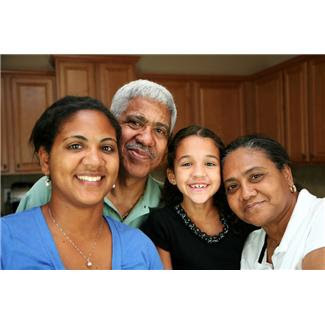 2. Church helps us connect with like-minded people and those with similar goals and values. In a church, certain standards of thought and conduct are understood. Parents look out for each other’s kids and blow the whistle if they see something concerning. They’re not afraid to challenge our kids if they hear words or see behavior that contradicts God’s Word.
2. Church helps us connect with like-minded people and those with similar goals and values. In a church, certain standards of thought and conduct are understood. Parents look out for each other’s kids and blow the whistle if they see something concerning. They’re not afraid to challenge our kids if they hear words or see behavior that contradicts God’s Word. They provide invaluable reinforcement in the weary trenches of parenting. They bolster our faith with their examples of standing for righteousness even when it costs something. They provide a peer group for wholesome activities and meaningful pursuits.
3. Church attendance is good for your health. Laura Rowley, in her article, “5 Surprising Scientific Reasons to Attend Church” writes, “Tyler J. VanderWeele, an epidemiologist with the Harvard School of Public Health, conducted a study of regular church-goers over two decades with his colleagues. He found that people who attend religious services at least once a week enjoy better blood pressure, healthier cardiovascular, immune and endocrine functions and less coronary artery disease than those who don’t attend at all”.
The article also notes, “People who go to services regularly are less likely to be depressed. A survey of nearly 100,000 women over 50 who attended religious services found they were 56 percent more likely to have a positive outlook on life and 27 percent less likely to be depressed, according to a study in the Journal of Religion and Health.
 4. Church knits people’s hearts together unlike anything else. Because we share the same Holy Spirit, our friendships are deeper, our conversations more intentional, and our time together richer and more life-changing. We’ve discovered the collective joy of serving our community, each other, and the Lord. Nothing builds a friendship like packing and inspecting 2,600 Operation Christmas Child boxes in a single afternoon. Or packing and delivering 100 Thanksgiving food boxes. Or volunteering at a crisis pregnancy center or a homeless woman’s shelter.
4. Church knits people’s hearts together unlike anything else. Because we share the same Holy Spirit, our friendships are deeper, our conversations more intentional, and our time together richer and more life-changing. We’ve discovered the collective joy of serving our community, each other, and the Lord. Nothing builds a friendship like packing and inspecting 2,600 Operation Christmas Child boxes in a single afternoon. Or packing and delivering 100 Thanksgiving food boxes. Or volunteering at a crisis pregnancy center or a homeless woman’s shelter. The satisfaction of working together on projects like these makes shallow, self-centered pursuits pale in comparison. At the end of the day, the shared experience of laboring together for a cause greater than ourselves builds eternal relationships.
5. Church is there for the good times and the bad. We’ve celebrated new babies, graduations, and marriages together. We’ve mourned job losses, cancer, and death. When our family received word while out of the country on a mission trip that my sister-in-law had died of a triple brain aneurysm, we couldn’t make it back in time for the funeral. Members of our church helped make funeral arrangements, fed the family, and stood beside our loved ones in our absence. For one daughter’s wedding, friends baked cakes and pies, tied a hundred bows, and cleaned up late into the night. We’ve done the same for them, with joy. It’s what family does.
6. Church gives us something bigger than ourselves in which to invest our lives. Paul, in 1 Corinthians 4:2 reminds us, “He who has been given a trust must prove faithful.” Each of us have been entrusted with a measure of time, talent, and treasure. One day we’ll give an account of what we did with it. And while there are a thousand good causes, there are also a thousand empty pursuits.
Christ gave believers one assignment—to build his kingdom by pointing others to himself. “Go therefore and make disciples of all the nations, baptizing them in the name of the Father and of the Son and of the Holy Spirit, teaching them to observe all things that I have commanded you;” (Matthew 28:19-20). God’s kingdom is the only one that promises eternal rewards and endless joy. Every time we give, teach, pray, and serve in God’s name, we invest in people—people who will live forever. When all is said and done, this is the most meaningful and significant way to spend and be spent.
These six reasons why we need church are a small sample of the hundreds I could describe. I’d like to conclude with perhaps the greatest reason: We need church because God is there. Yes, God lives in us, so, technically, he is present wherever we are, but when we gather as a body of believers for the purpose of worshiping him, his presence is almost palpable. He speaks through the music and the preaching. He draws us to his side through the collective prayers of his children. He inspires us through stories of others’ faithfulness. We are stronger, wiser, kinder, sweeter when we sit in our Father’s house, surrounded by our brothers and sisters, for the sole purpose of drawing closer to Him.
Why, oh why, would you want to miss this?
If you regularly attend a church, don’t stop. If you don’t, perhaps it’s time to give it a try. What do you have to lose? And what might you gain?
Now it’s your turn to share a reason why we need church. Leave a comment below and share your thoughts. If you’re reading by email, CLICK HERE to visit Hungry for God online and leave a comment.
 Are you hungry for God, but starving for time?
Are you hungry for God, but starving for time? I’d love to send you a 5-minute e-mail devotion twice a week to start your day off with the Lord.
Sign up for a free subscription to Hungry for God by CLICKING HERE.
Then, be sure to VALIDATE the confirmation email you receive.
Note: I promise never to spam you or share your email address.
Because busy women need to connect with God in the craziness of everyday life.
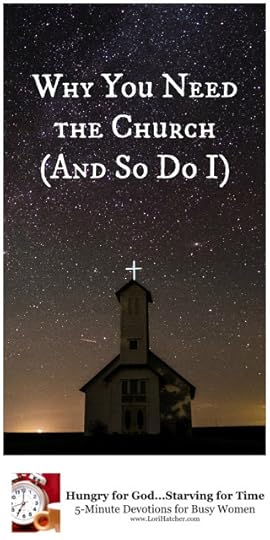
If this post was meaningful to you, would you consider sharing it with a friend by clicking on one of the buttons below? Did you know you can receive bi-weekly Hungry for God posts sent directly to your email inbox? Visit http://www.lori-benotweary.blogspot.com and click on the link in the right hand corner to Subscribe Via Email.
Copyright 2018 by Lori Hatcher
Published on June 09, 2019 16:47
June 2, 2019
How to Age Well
 In my job as a health care worker, I’m privileged to treat many elderly patients. I’ve worked in the same practice for more than 31 years, so I’ve also had the opportunity to watch our patient population age.
In my job as a health care worker, I’m privileged to treat many elderly patients. I’ve worked in the same practice for more than 31 years, so I’ve also had the opportunity to watch our patient population age. The ones who were children when I joined the staff now have children of their own. The college students are middle-aged. Those who were middle-aged are now elderly.
I find the middle-agers who are now senior citizens most interesting, probably because I see my future most clearly in them.
Some have aged well. Their faces have grown kinder. Their personalities have softened. Their eyes sparkle with laughter, and their hearts overflow with gratitude. Even though their physical limitations make caring for them more difficult, I look forward to seeing them because they’re fun, inspiring, and sweet.
Others, I’m sad to say, haven’t improved with age. Their words are impatient and sharp. Their faces wear a permanent scowl. They’re demanding, suspicious, and entitled. Instead of believing the best about the people who have cared for them all these years, they believe we’re part of a giant conspiracy to steal their money.
Watching people age has taught me much. It’s helped me realize I have a choice to make about how I approach each day—with grumbling or gratitude.
 If I choose to grumble about my aches, pains, and limitations, my grumpy words will reflect my grumpy attitude. If I demand special care because of my age, social status, or income, I’ll never be satisfied, because any effort will fall short by my unrealistic standards. If I grow suspicious and cynical and treat honest, hard-working people with distrust, I’ll sabotage any hope of genuine care, because relationships require trust.
If I choose to grumble about my aches, pains, and limitations, my grumpy words will reflect my grumpy attitude. If I demand special care because of my age, social status, or income, I’ll never be satisfied, because any effort will fall short by my unrealistic standards. If I grow suspicious and cynical and treat honest, hard-working people with distrust, I’ll sabotage any hope of genuine care, because relationships require trust. Like a dog who’s been eating out of the garbage can, the stench of my bad attitude will precede me, surround me, and linger behind me wherever I go. Before long, people will catch a whiff and hide rather than hold their breath in my presence.
 If I embrace gratitude, however, I’ll become a very different person. By focusing on my blessings (and everyone has some), I can change the atmosphere of a room almost instantly. By expressing thanks for the care others show me, I can validate those who feel unappreciated or overlooked. By trusting others and assuming the good (while exercising discretion, of course), I can foster an environment of mutual respect and commitment.
If I embrace gratitude, however, I’ll become a very different person. By focusing on my blessings (and everyone has some), I can change the atmosphere of a room almost instantly. By expressing thanks for the care others show me, I can validate those who feel unappreciated or overlooked. By trusting others and assuming the good (while exercising discretion, of course), I can foster an environment of mutual respect and commitment. Like bed sheets fresh from the clothesline, I can scatter sunshine and fresh air wherever I go. Instead of hiding when people see me coming, they’ll gravitate toward me, eager to share a smile, a laugh, or an encouraging word.
Of all the patients I've cared for, Mrs. Maisy is one of my favorites.
Well into her 90s, she lost a husband and a son in tragic deaths. While we’ve often talked about her losses, she always ends the conversation the same way. “I have much to be thankful for. God has given me a good life.”
For the last year or so, Mrs. Maisy’s been battling cancer. Three weeks before she passed away, she came in for a visit. Every staff member stuck their head into the treatment room to speak to her.
“How’re you doing, Mrs. Maisy?”
“Oh, I’m slowing down,” she said, shaking her head. But her blue eyes twinkled and a smile hovered at the corners of her mouth. “It won’t be long now. But I’m ready. I have much to be thankful for. God has given me a good life.”
Mrs. Maisy’s obituary was two columns long in the local paper, but I believe her greatest accomplishment wasn’t the committees she served on or the charities with which she worked. Her greatest accomplishment was demonstrating to the world that old doesn’t have to be synonymous for grumpy. Old can also mean grateful.
Thank you, Mrs. Maisy, for showing me how to age gracefully, squeeze every bit of joy out of life, and share that joy with those around me. Thanks for teaching me I have a choice about the type of old person I become—grumbly or grateful. I want to wear well the grateful gown you left behind.
"Give thanks to the Lord, for he is good; his love endures forever."(1 Chronicles 16:34).
Now it’s your turn. Have you known someone who got sweeter, kinder, and more grateful as they aged? How did their example impact you? Leave a comment below and share your story. If you’re reading by email, CLICK HERE to visit Hungry for God online and leave a comment.
 Are you hungry for God, but starving for time?
Are you hungry for God, but starving for time? I’d love to send you a 5-minute e-mail devotion twice a week to start your day off with the Lord.
Sign up for a free subscription to Hungry for God by CLICKING HERE.
Then, be sure to VALIDATE the confirmation email you receive.
Note: I promise never to spam you or share your email address.
Because busy women need to connect with God in the craziness of everyday life.
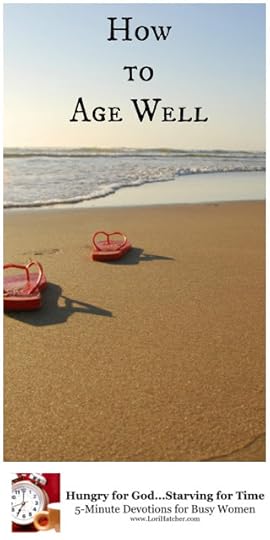
If this post was meaningful to you, would you consider sharing it with a friend by clicking on one of the buttons below? Did you know you can receive bi-weekly Hungry for God posts sent directly to your email inbox? Visit http://www.lori-benotweary.blogspot.com and click on the link in the right hand corner to Subscribe Via Email.
Copyright 2018 by Lori Hatcher
Published on June 02, 2019 18:50
May 28, 2019
7,000 Taste Buds
 Taste buds. Yep, that’s what I wrote in my journal today. Thank you, Lord, for taste buds.
Taste buds. Yep, that’s what I wrote in my journal today. Thank you, Lord, for taste buds. Has it ever occurred to you that God didn’t have to create us with taste buds? He could have made us like dogs, who only have enough taste buds to determine if their food is spoiled and could kill them.
Without taste buds, we’d eat simply to supply our bodies with enough calories to survive. It wouldn’t matter what we ate as long as we filled our stomachs. Like pumping gasoline into a gas tank. Or watering a plant.
Instead, God gave us 7,000 taste buds with the ability to sense sweet, salty, bitter, salty, and savory. And oh, the pleasure we experience when we taste the sweetness of a ripe watermelon. Or the salty deliciousness of a giant bowl of buttered popcorn. Or the savory, melt-in-your-mouth goodness of a perfectly-cooked steak.
First Timothy 6:17 gives us a glimpse of why God infused our bodies and our world with sensory pleasures. “Teach those who are rich in this world not to be proud and not to trust in their money, which is so unreliable. Their trust should be in God, who richly gives us all we need for our enjoyment.”
Did you catch the back half of this verse? “God, who richly gives us all we need for our enjoyment.”
When God created the world, he designed it for our pleasure. He created flowers with heavenly scents, sunsets with a rainbow of colors, and kittens with silky-soft fur. He made bumbly puppies with sweet-smelling puppy breath, chattering squirrels to make us laugh, and friends and family to enjoy life with.
God could have made the world utilitarian. Monochromatic. Efficient. Dull. Instead he created it with a billion spots of delight and pleasure. Our precious Father, who richly gives us all we need (and so much more) fashioned the world for our enjoyment.
What a gift. What a God.
Today, as you make your way through the world, take a moment and pause. Smell the air. Feel the sunshine or the rain. Savor the flavor of your food. Ponder the things that bring you pleasure. Then thank your creator, the God who loves you so much that he surrounds you with gifts to enjoy.
See. Hear. Touch. Smell. Taste. Be grateful.
Now it’s your turn. What has God created that you especially enjoy? Leave a comment below and share your sensory pleasures. If you're reading by email, click HERE to visit Hungry for God online.
 Are you hungry for God, but starving for time?
Are you hungry for God, but starving for time? I’d love to send you a 5-minute e-mail devotion twice a week to start your day off with the Lord.
Sign up for a free subscription to Hungry for God by CLICKING HERE.
Then, be sure to VALIDATE the confirmation email you receive.
Note: I promise never to spam you or share your email address.
Because busy women need to connect with God in the craziness of everyday life.

If this post was meaningful to you, would you consider sharing it with a friend by clicking on one of the buttons below? Did you know you can receive bi-weekly Hungry for God posts sent directly to your email inbox? Visit http://www.lori-benotweary.blogspot.com and click on the link in the right hand corner to Subscribe Via Email.
Copyright 2018 by Lori Hatcher
Published on May 28, 2019 17:20
May 26, 2019
Worry Is a Stray Cat
 There’s a stray cat in the neighborhood, and for whatever reason, it’s homed in on you.
There’s a stray cat in the neighborhood, and for whatever reason, it’s homed in on you. It howls at your doorstep. You shoo it away. When you come home at night, it’s lurking in the bushes. You rush inside, closing the door firmly in its face, but the next morning, there it is – waiting for you.
In a moment of weakness, you let it inside. Stroke it a few times. Let it nap in the sunny spot on the carpet. Feed it—just a morsel, because it’s crying so pitifully. Before long it’s sleeping in your bed, kneading you with its paws, disturbing your sleep, and leaving hair everywhere.
Worry is a lot like a stray cat. It lurks in the corners of our lives waiting to pounce. No matter how many times we shut the door in its face, it’s always there, waiting.
Sometimes we succumb and let it into our heart’s home. We give it full access to our minds and emotions. We feed it what ifs, and it thrives. Before long it takes over. Nothing—not even sleep—is safe from its needle-sharp claws. It crowds out our peace and leaves evidence of its presence clinging to everything.
If you’re struggling with worry, here are four biblical suggestions:
1. Recognize worry for what it is—and unwelcome guest. Worry has no place in the life of a believer. For years I excused my tendency to worry by saying, “I can’t help it. I’m a natural born worrier.” This is true. But believers aren’t natural any more, we’re supernatural. Because we have the Spirit of Christ living in us, we can triumph over the frailties of our human nature. We don’t have to be enslaved to them.
2. Don’t entertain it. Worry, like that stray cat I referred to, often shows up at our door. We can’t help that, but we can choose not to invite it in. Memorizing promises from God’s Word, praying, and keeping a thankful list can help us bar the door. “Be anxious for nothing,” God’s Word commands us, “but in everything by prayer and supplication, with thanksgiving, let your requests be made known to God” (Philippians 4:6).
3. Don’t feed it. Worry has the amazing ability to grow. The more we feed it, the fatter it gets. Following our thoughts down dark pathways, through sinister possibilities, and around terrifying turns fuels our fears, providing a nourishing diet for it to thrive. When we starve it by redirecting our thoughts, speaking truth into the situation, and channeling our ponderings into purposeful action, we cut off its supply.
4. Banish it with truth from God’s Word. Spending time in the Bible every day supplies a powerful antidote for worry. Reading true-life accounts of God’s faithfulness to believers down through the ages inspires us to trust him. Exploring the characteristics of God teaches us how much he loves us. Watching God’s plan of redemption play out on the pages of Scripture gives us glimpses of how God can also work in our lives. Worry flees in the face of truth, and the Bible is the best source of truth available.
If you’re struggling today, I hope you’ll take the garden hose of faith to the stray cat of worry. Truth be told, this unwelcome guest will continue to pester you this side of heaven, but these tips will provide a powerful way to guard your home and your heart.
 Are you hungry for God, but starving for time?
Are you hungry for God, but starving for time? I’d love to send you a 5-minute e-mail devotion twice a week to start your day off with the Lord.
Sign up for a free subscription to Hungry for God by CLICKING HERE.
Then, be sure to VALIDATE the confirmation email you receive.
Note: I promise never to spam you or share your email address.
Because busy women need to connect with God in the craziness of everyday life.

If this post was meaningful to you, would you consider sharing it with a friend by clicking on one of the buttons below? Did you know you can receive bi-weekly Hungry for God posts sent directly to your email inbox? Visit http://www.lori-benotweary.blogspot.com and click on the link in the right hand corner to Subscribe Via Email.
Copyright 2018 by Lori Hatcher
Published on May 26, 2019 16:58
May 22, 2019
Have We Forgotten to Have Fun?
 “Many of us have forgotten to have fun.”
“Many of us have forgotten to have fun.” These words from author and (my) agent Bob Hostetler shocked me. Until I realized his statement was true.
“Writers get so caught up in deadlines, and word counts, and edits that we forget what drew us to writing in the first place – the pure pleasure of the craft.”
You’re probably not a writer (although some of you are), but regardless of our profession or life circumstances, Bob’s words apply to us all.
Have you been so busy paying bills, keeping house, and meeting obligations that you’ve forgotten to have fun in your marriage?
Have you been so busy training your children, overseeing their education, and keeping them safe that you’ve forgotten to have fun in your parenting?
Have you been so busy caring for an aging parent or spouse, taking them to appointments, and meeting their physical needs that you’ve forgotten to have fun in your relationship?
Have you been so busy meeting your quota, climbing the ladder, and planning your next career move that you’ve forgotten to have fun in your work?
This week I’m learning and networking at the Blue Ridge Mountains Christian Writers Conference in Black Mountain, North Carolina. As Bob taught the first class of the week, "The Well-rounded Writer," he outlined his goals. “I’m going to teach you writing as ministry, business, and craft. But first, I’m going to help you have fun. I want to remind you why you fell in love with writing in the first place.”
Then he invited us to participate in an exercise entitled “First Lines.”
“Choose a first line and write a story about it,” he said. I chose this first line: “There’s nothing quite like the smell of . . ."
How would you complete this sentence? And what would the paragraph say?
In a moment I’m going to share my story, but before I do, I’d like to pose the same question Bob asked me. “Are you so busy doing __________ that you’ve forgotten to have fun?”
Be honest.
If the answer is yes, it may be time for intervention. I Googled “Fun family activities,” “fun date nights,” or “fun things to do in your workplace” and included a few of the more promising finds below. Why not scroll through the ideas and pick one? Then do what it takes to make it happen. You’ll be glad you did. So will the others around you.
"101 Fun Things to Do with Kids this Summer"
"Laugh for a Happier Marriage" on Family Life Today.
25 Ways to Have Fun at Work
Fun Activities to Do with Seniors
Maybe this post sparked a few ideas of your own. I'd love for you to leave a comment at the bottom to tell us what you did to add fun to your situation. Who knows? Your bright idea may inspire someone else’s, which may inspire someone else’s, until everyone remembers a thing or two they love about the life they’re living.
Now, are you curious about how I finished the sentence, “There’s nothing quite like the smell of . . . “?
Here goes:
 There’s nothing quite like the smell of bacon. It draws men from everywhere. Trust me, I know.
There’s nothing quite like the smell of bacon. It draws men from everywhere. Trust me, I know. If you’ve ever flown out of Columbia Metropolitan Airport, you know that the first smell to greet you as you make your way up the long ramp between the TSA checkpoint and your gate is the smell of bacon.
There’s a little kiosk at the end of that ramp, and every morning at 4 a.m., someone starts frying bacon. For three years, that someone was me.
That’s how I learned the power of bacon. Within minutes of firing up the griddle and slinging the greasy strips of pork onto the sizzling surface, men would begin to line up. Handsome men in business suits, maintenance workers in coveralls, and everyone in between – all drawn to the smell of bacon—and me, their cheerful cook.
I worked there every summer -- until I married – a pork-loving, business man who queued up at my kiosk every month for a year so I could serve him bacon.
(In case you’re wondering, this story is an amalgamation of truth and fiction. Which parts do you think are true? Leave your guess in the comment box. I’ll tell you which is which in a day or so.)
 Are you hungry for God, but starving for time?
Are you hungry for God, but starving for time? I’d love to send you a 5-minute e-mail devotion twice a week to start your day off with the Lord.
Sign up for a free subscription to Hungry for God by CLICKING HERE.
Then, be sure to VALIDATE the confirmation email you receive.
Note: I promise never to spam you or share your email address.
Because busy women need to connect with God in the craziness of everyday life.

If this post was meaningful to you, would you consider sharing it with a friend by clicking on one of the buttons below? Did you know you can receive bi-weekly Hungry for God posts sent directly to your email inbox? Visit http://www.lori-benotweary.blogspot.com and click on the link in the right hand corner to Subscribe Via Email.
Copyright 2018 by Lori Hatcher
Published on May 22, 2019 17:12
May 19, 2019
Trust the Baker. Follow the Instructions

I should have listened to my friend Karen. “Sprinkle the nuts in the bottom of the pan, then arrange 15 frozen bread balls on top.”
I was listening, really I was, but when I stood in the kitchen looking into the Bundt pan, fifteen just didn’t look right. They barely covered the bottom.
I think she said 15. But maybe I didn’t hear her right. Or maybe her pan is smaller than mine.
I looked again at those meager globs. That doesn’t look like much at all, and we have seven people to feed. It wouldn’t hurt to throw in a few more.
So I did. Ten more to be exact.
Then I poured the butter over the top, covered the pan in plastic wrap, and went to bed. As instructed. All night long I dreamed of gooey sticky buns.
The next morning I awoke to a disturbing text message from my daughter.
There’s been an explosion.
At first I thought she was referring to one of the grandchildren. The one who still wears diapers. But then I remembered the sticky buns.
 A second message vibrated my phone. It was a picture of my sticky buns. Mushrooming from the Bundt pan like a size 18 lady wearing a size 12 pants.
A second message vibrated my phone. It was a picture of my sticky buns. Mushrooming from the Bundt pan like a size 18 lady wearing a size 12 pants. It won’t fit in the oven, she texted. What do I do?
I’m ashamed to admit there have been quite a few times in my life when I’ve been convinced I know more than the expert. I don’t follow the doctor’s recommendation. I disregard directions on the back of a bottle. I ignore the maintenance light on the dash.
Sometimes I even think I know more than God. Imagine that.
I react angrily despite his warning that “human anger does not produce the righteousness that God desires.”
I stay up past midnight working despite his reminder, “It is vain for you to rise up early, To sit up late, To eat the bread of sorrows; For so He gives His beloved sleep“ (Psa. 127:2).
I worry despite his call to “Be anxious for nothing, but in everything by prayer and supplication, with thanksgiving, let your requests be made known to God” (Phil. 4:6-7).
I ignore God’s instructions and go my own way, dismissing the instructions and principles he’s given me for holy, healthy, productive living. And then I’m surprised when things don’t turn out right.
Anger injures my relationships and damages my testimony. Lack of sleep reveals my lack of trust and endangers my health. Anxiety steals the joy from my days and the sleep from my nights.
Like my friend Karen knows the intricacies of her recipe, God knows every detail of my life. And the world in which I live. And the future I hope to inherit. He provides principles to live by, hope to cling to, and a future to dream of.
Why, oh why would I ever think I know better than he?
After lowering the oven rack, I gingerly placed the pan of bread dough in the oven, watching it warily through the glass door. The heat stopped the dough from rising any farther, and before long it was cooked. I flopped it onto a (rather large) plate and sighed. My pan of sticky buns bore little resemblance to the picture-perfect masterpieces my friend Karen makes.
The extra dough stuck out everywhere, the inside hadn’t cooked thoroughly, and instead of being drenched in buttery caramel, much of the bread was crispy and dry. It was edible, but very different from the yummy dessert I’d hoped to enjoy.
When I disregard God’s instructions for living, the same thing happens. Bits and pieces of our lives stick out everywhere, rebelliously refusing to stay in the margins. Some parts are under done, immature and stunted. I don’t achieve the full potential God intends for my life.
Whether we’re talking about sticky buns or our Christian life, we have the greatest chance of success when we trust the Baker and follow the instructions.
“Do not be wise in your own eyes; Fear the LORD and depart from evil. It will be health to your flesh, And strength to your bones” (Proverbs 3:7-8).
Now it’s your turn. When have you failed to follow instructions (either man’s or God’s) and regretted it? What did you learn from your experience? Share your story in the comment box below. If you’re reading via email, click HERE to visit Hungry for God online and share your thoughts.
 Are you hungry for God, but starving for time?
Are you hungry for God, but starving for time? I’d love to send you a 5-minute e-mail devotion twice a week to start your day off with the Lord.
Sign up for a free subscription to Hungry for God by CLICKING HERE.
Then, be sure to VALIDATE the confirmation email you receive.
Note: I promise never to spam you or share your email address.
Because busy women need to connect with God in the craziness of everyday life.

If this post was meaningful to you, would you consider sharing it with a friend by clicking on one of the buttons below? Did you know you can receive bi-weekly Hungry for God posts sent directly to your email inbox? Visit http://www.lori-benotweary.blogspot.com and click on the link in the right hand corner to Subscribe Via Email.
Copyright 2018 by Lori Hatcher
Published on May 19, 2019 16:00
May 15, 2019
What's Inside is Gonna Come Out -- 5 Steps to Conquer Sin
A few years ago I was the unhappy middle man in a collision between an SUV and a Porta-Potty truck. It wasn’t funny at the time, especially because the accident preempted my plans for a Chick Fil A lunch and sent me to the doctor instead. Thankfully the only real victim was my 2005 Toyota Corolla.
When my husband, David, replaced our crumpled car, I was delighted. The same model as our dearly departed, this Corolla was only two years old and in great condition.
Except for one thing. The upholstery was disgusting.
I’m amazed that neither of us noticed the problem. I guess, when we rode in the driver or passenger’s seats, our eyes were either on the road or on the instrument panel. But when I climbed into the back seat to allow David and a friend to ride up front, I saw stuff I hadn’t noticed before.
 It looked like someone had shaken up a Coke and popped the tab. Spots were everywhere. Then I saw oily spots on the front headrests, seat backs, and arm rests. And nasty brown stains on the upholstery.
It looked like someone had shaken up a Coke and popped the tab. Spots were everywhere. Then I saw oily spots on the front headrests, seat backs, and arm rests. And nasty brown stains on the upholstery.“Ewwwww!” I said, “the inside of this car is gross.” My husband sprang into action. He grabbed a can of cleaner and the carpet shampooer and went to work. An hour and a half later, the interior of the car looked three shades lighter.
“My hero!” I proclaimed, and hugged him hard. After the seats dried, I checked them over. Much better.
Until the next afternoon, when I spilled a bottle of water in the passenger seat. “No worries,” my husband said. “It’s only water, It’ll dry just fine."
But it didn’t.
The water had left a giant stain. “How can clean water leave a brown stain?” I asked my husband in dismay.
“There still must be gunk under the upholstery. On the surface, it looks clean, but when water soaks in, what’s hidden inside comes to the top.”
Apparently people and upholstery have a lot in common.
I’m a classic example. On the surface I look clean. Pastor’s wife, Christian speaker, inspirational writer, Sunday School teacher. But then something happens.
 Like the spill on my car’s front seat, what’s under the surface rises to the top, and it isn’t pretty. I display gunk like impatience, selfishness, and unkind words. It stains my heart and my relationships.
Like the spill on my car’s front seat, what’s under the surface rises to the top, and it isn’t pretty. I display gunk like impatience, selfishness, and unkind words. It stains my heart and my relationships.The only treatment is to clean deep down, under the surface. God’s Word provides a solution:
1. Invite God to search our hearts every day. Pray Psalm 139:24-25: “Search me, O God, and know my heart; Try me, and know my anxieties; And see if there is any wicked way in me.” When we allow God to examine our hearts and reveal anything that displeases him, we begin to change.
2. Agree with God instead of making excuses. For years I dismissed my sin of impatience by hiding it under the label of productivity. But putting projects before people never honors God. When the Lord convicted my heart of this sin, I owned up and asked him to transform me. Often. The Bible calls this repentance, which simply means agreeing with God about our sin (Isaiah 30:15).
3. Recognize Satan’s tricks. Once the Lord brings a sin to light, it’s important we don’t allow Satan to beat us over the head with it. We’re often tempted to give in to guilt and condemnation, but neither come from God. They’re tricks from Satan, who lies to us to keep us defeated. If he can paralyze us with guilt or render us powerless with condemnation, we’ll wallow in our sin instead of conquering it.
4. Make a biblical plan. God’s Word tells us to confess (agree with God about our sin), repent (express our desire to change), and forsake (turn our backs on our sin) (1 John 1:9). Unfortunately, this isn’t usually one and done. We have to repeat the process every time we slip back into our destructive behavior.
Memorizing specific Bible verses related to our sin will give the Holy Spirit extra cleansing power. Eventually we’ll grow so sick of our sin that we'll hate it. This allows us to turn away and replace our negative behavior with positive choices.
5. Rely on God’s power, not our own. Within ourselves, we’re powerless to change. But if we’ve trusted Christ as our Savior, we have the power of Christ living inside us—the same power that raised Christ from the dead (Romans 8:11). This is some serious muscle. Moment by moment, day by day, we can rest in his strength to do what’s right.
Father, within myself I’m powerless to conquer this sin. Help me claim the power that raised Christ Jesus and say no to ungodliness. Enable me to recognize potential to sin before it traps me. Empower me to close my mouth, avert my eyes, or walk away. Help me replace my sinful choices with wholesome ones so I can bring glory to your name. When I fall back into my old ways, help me confess, repent, and forsake. No matter how many times it takes. In the mighty name of Jesus I ask, Amen.
When our attempts to clean (really clean) our car’s upholstery failed, we called on an expert. He gave us a solution that penetrated the layers of gunk hiding in our seats. We saturated the seats, gave it time to work, and scrubbed away the dirt it brought to the surface. I haven’t spilled any water yet, but I’m confident if I do, nothing yucky will appear.
Unfortunately, battling sin is a little harder than battling dirty upholstery. With God empowering us, however, we can be victorious. When we submit to the cleansing power of the Holy Spirit, use the sanitizer of God’s Word, and apply the muscle of Christ living inside us, we can be as clean on the inside as we are on the outside.
 Are you hungry for God, but starving for time?
Are you hungry for God, but starving for time? I’d love to send you a 5-minute e-mail devotion twice a week to start your day off with the Lord.
Sign up for a free subscription to Hungry for God by CLICKING HERE.
Then, be sure to VALIDATE the confirmation email you receive.
Note: I promise never to spam you or share your email address.
Because busy women need to connect with God in the craziness of everyday life.

If this post was meaningful to you, would you consider sharing it with a friend by clicking on one of the buttons below? Did you know you can receive bi-weekly Hungry for God posts sent directly to your email inbox? Visit http://www.lori-benotweary.blogspot.com and click on the link in the right hand corner to Subscribe Via Email.
Copyright 2018 by Lori Hatcher
Published on May 15, 2019 17:11
May 12, 2019
Are you going to live a long time?
“Gigi,” my five-and-a-half-year-old granddaughter, Lauren, asked as I tucked her into bed, “are you going to live a long time?”
“I certainly hope so,” I said.
“Unless you get like Mr. Arnold next door who, you know. . .” She hesitated before saying the word, “. . . died?”
 Her question hung in the air, and, to be honest, I wasn’t sure how to answer it. She had apparently realized that people don’t live forever—on this earth, anyway. Two desires struggled within me. I wanted to be honest, because she needs to be able to trust me. But I also wanted to protect her from the fear of losing someone she loves.
Her question hung in the air, and, to be honest, I wasn’t sure how to answer it. She had apparently realized that people don’t live forever—on this earth, anyway. Two desires struggled within me. I wanted to be honest, because she needs to be able to trust me. But I also wanted to protect her from the fear of losing someone she loves.
“Sometimes, people do get sick and die,” I admitted. “But usually not until they’re very old. Mr. Arnold was more than 80.”
She nodded slowly, unconvinced.
“Every morning I pray and ask God to keep all our family healthy and strong," I said. "You can do that too. We can trust God to know what’s best.”
“Sometimes I get scared,” she said.
“I do, too. Did you know there’s a verse in the Bible that tells us what to do when we get scared? Psalm 56:3: ‘When I am afraid, I will trust in you.’ It reminds me that God is wise, and kind, and we can trust him.”
Comforted, she snuggled down under the sheet and closed her eyes. I kissed her forehead and whispered goodnight.
“Gigi,” she whispered sleepily as I crept out the door, “how old are you?”
Sometimes I feel a lot like Lauren. When I peer into an unknown future, fear clutches at my heart and sends my thoughts down dark and scary paths. I wonder what my death will look like.
Will it come swiftly in an accident or slowly by disease? Will I live out a full life or step into heaven sooner? Will I lose my mind to Alzheimer’s or my body to aging?
Only God knows.
 In his sovereignty, there are no premature deaths. All the days of our lives were written in his book before one of them came to be (Psalm 139:16). And although only God knows the number of our days, he calls us to capture each one of them and use them for good.
In his sovereignty, there are no premature deaths. All the days of our lives were written in his book before one of them came to be (Psalm 139:16). And although only God knows the number of our days, he calls us to capture each one of them and use them for good.
“Teach us to number our days, that we may gain a heart of wisdom,” the psalmist prayed in Psalm 90:12. It’s not healthy to live each day in fear that it’s our last, but we also shouldn’t fritter our lives away as carelessly as a lottery winner spends money after a jackpot. However many days there are, one thing is certain—each one is precious. We must savor and spend them wisely.
Whether we’re as old as Mr. Arnold or as young as Lauren, may we glorify God with each day he gives us.
 Are you hungry for God, but starving for time?
Are you hungry for God, but starving for time?
I’d love to send you a 5-minute e-mail devotion twice a week to start your day off with the Lord.
Sign up for a free subscription to Hungry for God by CLICKING HERE.
Then, be sure to VALIDATE the confirmation email you receive.
Note: I promise never to spam you or share your email address.
Because busy women need to connect with God in the craziness of everyday life.
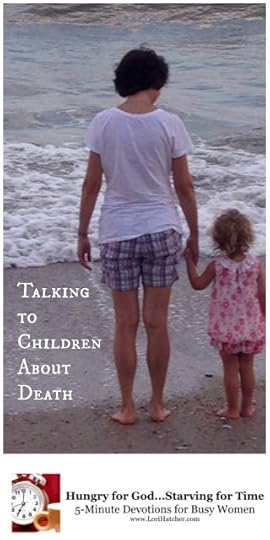
If this post was meaningful to you, would you consider sharing it with a friend by clicking on one of the buttons below? Did you know you can receive bi-weekly Hungry for God posts sent directly to your email inbox? Visit http://www.lori-benotweary.blogspot.com and click on the link in the right hand corner to Subscribe Via Email.
Copyright 2018 by Lori Hatcher
“I certainly hope so,” I said.
“Unless you get like Mr. Arnold next door who, you know. . .” She hesitated before saying the word, “. . . died?”
 Her question hung in the air, and, to be honest, I wasn’t sure how to answer it. She had apparently realized that people don’t live forever—on this earth, anyway. Two desires struggled within me. I wanted to be honest, because she needs to be able to trust me. But I also wanted to protect her from the fear of losing someone she loves.
Her question hung in the air, and, to be honest, I wasn’t sure how to answer it. She had apparently realized that people don’t live forever—on this earth, anyway. Two desires struggled within me. I wanted to be honest, because she needs to be able to trust me. But I also wanted to protect her from the fear of losing someone she loves. “Sometimes, people do get sick and die,” I admitted. “But usually not until they’re very old. Mr. Arnold was more than 80.”
She nodded slowly, unconvinced.
“Every morning I pray and ask God to keep all our family healthy and strong," I said. "You can do that too. We can trust God to know what’s best.”
“Sometimes I get scared,” she said.
“I do, too. Did you know there’s a verse in the Bible that tells us what to do when we get scared? Psalm 56:3: ‘When I am afraid, I will trust in you.’ It reminds me that God is wise, and kind, and we can trust him.”
Comforted, she snuggled down under the sheet and closed her eyes. I kissed her forehead and whispered goodnight.
“Gigi,” she whispered sleepily as I crept out the door, “how old are you?”
Sometimes I feel a lot like Lauren. When I peer into an unknown future, fear clutches at my heart and sends my thoughts down dark and scary paths. I wonder what my death will look like.
Will it come swiftly in an accident or slowly by disease? Will I live out a full life or step into heaven sooner? Will I lose my mind to Alzheimer’s or my body to aging?
Only God knows.
 In his sovereignty, there are no premature deaths. All the days of our lives were written in his book before one of them came to be (Psalm 139:16). And although only God knows the number of our days, he calls us to capture each one of them and use them for good.
In his sovereignty, there are no premature deaths. All the days of our lives were written in his book before one of them came to be (Psalm 139:16). And although only God knows the number of our days, he calls us to capture each one of them and use them for good. “Teach us to number our days, that we may gain a heart of wisdom,” the psalmist prayed in Psalm 90:12. It’s not healthy to live each day in fear that it’s our last, but we also shouldn’t fritter our lives away as carelessly as a lottery winner spends money after a jackpot. However many days there are, one thing is certain—each one is precious. We must savor and spend them wisely.
Whether we’re as old as Mr. Arnold or as young as Lauren, may we glorify God with each day he gives us.
 Are you hungry for God, but starving for time?
Are you hungry for God, but starving for time? I’d love to send you a 5-minute e-mail devotion twice a week to start your day off with the Lord.
Sign up for a free subscription to Hungry for God by CLICKING HERE.
Then, be sure to VALIDATE the confirmation email you receive.
Note: I promise never to spam you or share your email address.
Because busy women need to connect with God in the craziness of everyday life.

If this post was meaningful to you, would you consider sharing it with a friend by clicking on one of the buttons below? Did you know you can receive bi-weekly Hungry for God posts sent directly to your email inbox? Visit http://www.lori-benotweary.blogspot.com and click on the link in the right hand corner to Subscribe Via Email.
Copyright 2018 by Lori Hatcher
Published on May 12, 2019 17:32
May 8, 2019
Celebrating Biblical Hospitality
This week my husband and I have been the grateful recipients of hospitality. Truth be told, we’d much rather be the ones extending hospitality. In our self-sufficient society, it’s much more comfortable to be the gracious givers than humble receivers.
But every now and then, we all need help. Such was the case this week when we vacated our house to extend hospitality to a special family who needed our home more than we did. In advance of their arrival, we tossed around a few ideas about where to stay. The back porch was unairconditioned. The tent leaks. Extended Stay America was pricey. So was Airbnb.
Then a friend offered to let us stay in the room over their garage. “It has its own bathroom,” she said, “and it’s right off the kitchen. You are more than welcome. We’d love to have you.”
So we accepted. Gratefully.
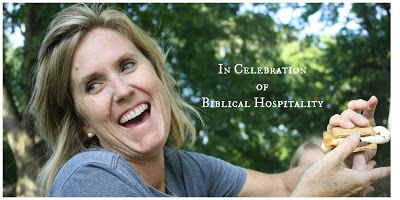 For almost a week they shared their kitchen, their hot water, their laundry room, and, glory be, their air conditioning. We exchanged greetings as we’ve headed out to work in the mornings and shared meals in the evenings where we’ve recapped our days.
For almost a week they shared their kitchen, their hot water, their laundry room, and, glory be, their air conditioning. We exchanged greetings as we’ve headed out to work in the mornings and shared meals in the evenings where we’ve recapped our days.
Best of all, we got to know each other better, prayed together, and laughed. Although we’ve been friends for decades, our time in their home knitted our hearts together and gave us greater insight into how to love and support each other.
Instead of being stressful and difficult, our time away from our home has been restful and relaxing. Our host and hostess have sweetly demonstrated what 1 Peter 4:9-10 instructs:
“Be hospitable to one another without grumbling. As each one has received a gift, minister it to one another, as good stewards of the manifold grace of God” (1 Peter 4:9-10).
If you have the opportunity to extend hospitality, whether it’s inviting a church visitor home for dinner after the service, having neighbors over for burgers and games, or allowing a college student to live in your spare bedroom between semesters, I encourage you to do it.
 God will use your kindness and generosity in ways you can never imagine. In the marvelous, mysterious economy of God, everything you’ve given in Jesus’ name will find its way back to you, shaken, pressed down, and running over, either in this life or in the life to come.
God will use your kindness and generosity in ways you can never imagine. In the marvelous, mysterious economy of God, everything you’ve given in Jesus’ name will find its way back to you, shaken, pressed down, and running over, either in this life or in the life to come.
“A generous man will prosper; he who refreshes others will himself be refreshed” (Proverbs 11:25).
Now it’s your turn. When have you extended hospitality in Jesus’ name and been refreshed by doing so? Share your experience in a comment below. If you’re reading by email, CLICK HERE to visit Hungry for God online and share.
[image error] And if you'd like to read more about how practicing hospitality can advance God's kingdom, I invite you to check out Brandon Clements' book, The Simplest Way to Change the Word -- Biblical Hospitality as a Way of Life.

 Are you hungry for God, but starving for time?
Are you hungry for God, but starving for time?
I’d love to send you a 5-minute e-mail devotion twice a week to start your day off with the Lord.
Sign up for a free subscription to Hungry for God by CLICKING HERE.
Then, be sure to VALIDATE the confirmation email you receive.
Note: I promise never to spam you or share your email address.
Because busy women need to connect with God in the craziness of everyday life.
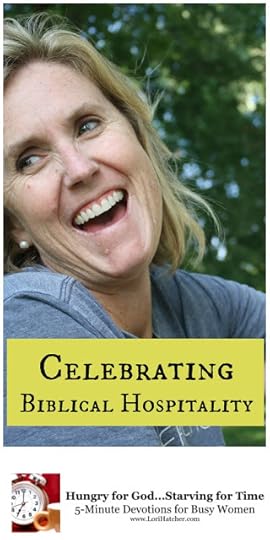
If this post was meaningful to you, would you consider sharing it with a friend by clicking on one of the buttons below? Did you know you can receive bi-weekly Hungry for God posts sent directly to your email inbox? Visit http://www.lori-benotweary.blogspot.com and click on the link in the right hand corner to Subscribe Via Email.
Copyright 2018 by Lori Hatcher
But every now and then, we all need help. Such was the case this week when we vacated our house to extend hospitality to a special family who needed our home more than we did. In advance of their arrival, we tossed around a few ideas about where to stay. The back porch was unairconditioned. The tent leaks. Extended Stay America was pricey. So was Airbnb.
Then a friend offered to let us stay in the room over their garage. “It has its own bathroom,” she said, “and it’s right off the kitchen. You are more than welcome. We’d love to have you.”
So we accepted. Gratefully.
 For almost a week they shared their kitchen, their hot water, their laundry room, and, glory be, their air conditioning. We exchanged greetings as we’ve headed out to work in the mornings and shared meals in the evenings where we’ve recapped our days.
For almost a week they shared their kitchen, their hot water, their laundry room, and, glory be, their air conditioning. We exchanged greetings as we’ve headed out to work in the mornings and shared meals in the evenings where we’ve recapped our days. Best of all, we got to know each other better, prayed together, and laughed. Although we’ve been friends for decades, our time in their home knitted our hearts together and gave us greater insight into how to love and support each other.
Instead of being stressful and difficult, our time away from our home has been restful and relaxing. Our host and hostess have sweetly demonstrated what 1 Peter 4:9-10 instructs:
“Be hospitable to one another without grumbling. As each one has received a gift, minister it to one another, as good stewards of the manifold grace of God” (1 Peter 4:9-10).
If you have the opportunity to extend hospitality, whether it’s inviting a church visitor home for dinner after the service, having neighbors over for burgers and games, or allowing a college student to live in your spare bedroom between semesters, I encourage you to do it.
 God will use your kindness and generosity in ways you can never imagine. In the marvelous, mysterious economy of God, everything you’ve given in Jesus’ name will find its way back to you, shaken, pressed down, and running over, either in this life or in the life to come.
God will use your kindness and generosity in ways you can never imagine. In the marvelous, mysterious economy of God, everything you’ve given in Jesus’ name will find its way back to you, shaken, pressed down, and running over, either in this life or in the life to come. “A generous man will prosper; he who refreshes others will himself be refreshed” (Proverbs 11:25).
Now it’s your turn. When have you extended hospitality in Jesus’ name and been refreshed by doing so? Share your experience in a comment below. If you’re reading by email, CLICK HERE to visit Hungry for God online and share.
[image error] And if you'd like to read more about how practicing hospitality can advance God's kingdom, I invite you to check out Brandon Clements' book, The Simplest Way to Change the Word -- Biblical Hospitality as a Way of Life.

 Are you hungry for God, but starving for time?
Are you hungry for God, but starving for time? I’d love to send you a 5-minute e-mail devotion twice a week to start your day off with the Lord.
Sign up for a free subscription to Hungry for God by CLICKING HERE.
Then, be sure to VALIDATE the confirmation email you receive.
Note: I promise never to spam you or share your email address.
Because busy women need to connect with God in the craziness of everyday life.

If this post was meaningful to you, would you consider sharing it with a friend by clicking on one of the buttons below? Did you know you can receive bi-weekly Hungry for God posts sent directly to your email inbox? Visit http://www.lori-benotweary.blogspot.com and click on the link in the right hand corner to Subscribe Via Email.
Copyright 2018 by Lori Hatcher
Published on May 08, 2019 16:42
Refresh Blog
A place to refresh your faith, hope, and prayers with 5-minute weekly posts.
- Lori Hatcher's profile
- 101 followers



